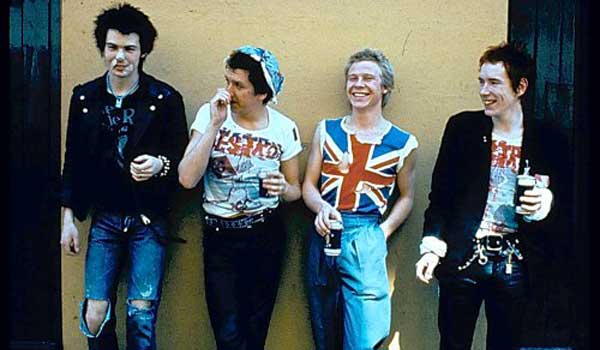Old habits don’t just shrivel up and choke in Britain. They retreat to the back of our psyches and haunt us like grim spectres in black cloaks, armed with the glimmering threat of our own bad conscience. As an island nation, we’re hard-wired into it.
Take, for example, our time-honoured tradition of exalting figures simply because they demand to be exalted. Look at the monarchy or reality TV stars — what a stinking bunch of meritless rotters they are. But who keeps them ticking along? We’re all complicit in this game.
Books however, like Jon Savage’s history of the original punk movement, England’s Dreaming, pour light on what happens when we do attempt to deal with these issues. At the time, the Pistols weren’t just taking aim at Queen Liz, but — by manipulating the media through outrageous TV appearances, scandalous live performances and artful political sloganeering — the value of what it meant to be a public figure too. Savage, a Cambridge-educated Baby Boomer, remembers it well.
“It was more emotional when it started,” Savage recalls. “It only became politicised once people started writing about it and when The Clash started singing about tower blocks. The Sex Pistols were never so specific. They were stage-managed, but that doesn’t mean they weren’t real. There’s a lot bad class faith in popular culture and music, and a lot people try and drop down their class by a notch, which is a bit pathetic. You are who you are — get on with it.
When Savage published England’s Dreaming in 1991, it wasn’t just another stale reappraisal of punk’s legacy; it was the first, and is still perhaps the best, book of its kind. With an even focus on key players and minor figures alike, told by a man who witnessed the entire shebang while writing for NME rival Sounds, it provided a window into an era that is still much fought over. Today, Savage has just published its follow up, The England’s Dreaming Tapes — a compendium of unpublished interviews that didn’t make the initial cut. But given the nature of sequels, isn’t he concerned about the stench of filthy lucre?
“Well, my publisher got in touch and said ‘How about doing a new book of all the interviews?’ And that’s how it happened,” he explains. “So rather than retell it again, I put them all the interviews in as a whole. It was, after all, a brilliant story. For pop music to become a national, cultural phenomenon is just fantastic, especially because it was so divisive. And so many people still say they were involved when they weren’t. You had to have some sort of courage to get involved. It was very much a minority activity at the time.”

The England’s Dreaming Tapes by Jon Savage is out now, published by Faber & Faber. The following is a previously unpublished interview courtesy of Jon Savage. Republication of it in any form is strictly prohibited.
Danny Fields
================

This interview with American journalist and record executive Danny Fields took place in Midtown Manhattan during 1989. Danny Fields was the man responsible for discovering the Ramones and helping them sign to Sire records, formerly Elektra for whom he worked as publicist. Elsewhere he acted as a catalyst in his label’s decision to sign both MC5 and The Stooges, and went onto to not only co-managed the Ramones themselves, Steve Forbert and The Modern Lovers, too. During this interview Danny appeared disengaged but informative and insightful nonetheless. He is currently writing his memoirs.
How did you first get involved in the music industry?
In 66 when I answered an ad in the paper. I found myself editor of a fan magazine, called Datebook. I went around loving it all and making friends with everybody, and I’ve been coasting along ever since from knowing the people I met then.
I joined Elektra in spring 67. The MC5 and Iggy were signed the same day. I signed them, single handedly. I went to Detroit to see the MC5, I liked them, the size of their audience. I wasn’t A&R, I was publicity, but the music business was much more free-wheeling, and Elektra had just had success with the Doors and wanted to be in the world of rock’n’roll.
And Wayne Kramer I think perceived that I was looking for something a bit more on the edge musically than they were, and he said, you ought to see our little brother band, the Stooges. The next day I saw the Stooges, and their manager was a loose partner of John Sinclair, so I called Jac Holzman and said, I’ve just shaken hands on two bands, how much can we give them? He said, give the MC5 twenty, and the other band five. I went and told them, and they never knew there was so much money in the world. They were both signed.
Were the Stooges very different from what was going on?
It’s all there on the first two albums. People think it was Iggy’s persona. but it was equally the sound of the band. That was down to Iggy too, it was his band and he wanted them to sound like that. I still melt when I hear those records. I was afraid they were two or three year ahead of their time, but they turned out to be twenty years ahead of their time. The Ramones loved the Stooges, they knew all the guitar work of Ashton and Williamson. Everybody knew the records. The first time I saw the Sex Pistols, and the Ramones, I felt like that too.
Did you see the Velvets in 66?
Before that. I saw them at the Cafe Wha on 3rd Street. I was a hanger on at the Factory, and I was there when they were introduced to the Factory. I used to go on tour with them, and hang out. Very smitten with them.
None of those bands were really successful.
They all had their reasons for not being. If they had been, who knows, we wouldn’t be sitting here having this conversation at all. Maybe that’s why we like them so much.
When did you leave Elektra?
January 20th 1969. I went to Atlantic, with the MC5. I really managed the Stooges, and Atlantic was my pretend job. I wasn’t about to promote Emerson Lake and Palmer… they did have the Allman Brothers, that I liked. They had Led Zeppelin and the Rolling Stones.I think my next job was Sixteen magazine, probably. I often had two jobs at once, so sometimes it gets a little hazy. I worked with Steve Paul who was managing Johnny and Edgar Winter, and we managed the Modern lovers briefly.
How did you find out about the Ramones?
At that time I had a column in SoHo news, writing about bands, a gossip column. They were bombarding me with phone calls, how come you’re always writing about Patti Smith and Television, and you never write about us? Well, I don’t know, I haven’t seen you. They were tireless in their pursuit of publicity, and Lisa Robinson and I made a deal to save each other time, we’d go see different bands and brief each other afterwards. I don’t remember who I went to see but she saw the Ramones and said, you’ll love them, go and see them. They were doing seventeen minute sets.
Did they have that look?
Their look never changed. I always liked fast music, simple strong and fast. I had a chance to discover Bruce Springsteen, but his lyrics turned me off, I thought he used too many words, it bored me. Nice guy, but too many words. The Ramones were faster than anything I’d ever heard. Great tunes, you could sing along with the little tunes.
I saw Patti Smith at her first ever gig with music, at the Church. I recorded it, I still have it somewhere. I’m pretty sure I saw Television at CBGBs the first time. They were like neo-romantic psychedelia, and then Blondie was pop, and Blondie made it biggest of all those groups. I knew they would, and I liked them the least.
Would it be right to say there was almost no black influence in punk at that time?
Yeah, right. The Ramones hated anything black, it was something they were trying to get away from. It infuriated them to hear the English punks saying that black music was the only real rock’n’roll, they thought that was bullshit, they were almost anti-black in that sense. They didn’t like anything black, period. With the exception of Motown. There always was a very racist context in middle class white New York.
Was it easy to get a contract when you started managing the Ramones?
It was easy to get a contract, thanks to Seymour, and for our ability to manoeuvre the New York press. Its when you try to approach the rest of the country that you encounter problems. Getting a booking agent was a problem, we went through seven. I wanted Premier Talent, but they weren’t taking any of this seriously. I booked them into some places myself. I got them into Boston, which was the first place outside of New York the Ramones ever played.
Radio was the problem, they had the thirty stations that you always get, that I can name, and nothing. We invented the touring circuit for this kind of band, by going in there first. Perhaps we should have been astute enough to have invented the college circuit, to tie that all together. After a few trips around the country we knew where we could go. When we’d go back, there’d be six new bands who’d seen the Ramones play, just like the Ramones did with the Dolls, and just like the Clash did with the Ramones.
The first album was very cheap to produce, wasn’t it?
Six thousand two hundred dollars. It wasn’t thought out. I’m glad you think it sounds that way, but $6000 to make an album, who has time to think? I guess there was the ideal to the band, there was a point to make. What was thought out was the whole group, but not that particular album. All the approaches had been thought out already, so the album was just making the statement.
Like the picture on the cover, you didn’t have to waste any time figuring out where to put these guys, you put them in the alley behind CBGBs and make sure its in focus, shoot in black and white. They had invented themselves, and they could probably have done the album for six hundred dollars.
Where did they get that look?
That’s the way they dressed. Everyone hates to part with a pair of jeans when the knees go. Leather jackets were just the way people looked in the suburbs at that time. It has since become a hustler look, but the hustler look back then was more polyester.
Was the group aware of the impact that album had in England?
Yeah, we were turning down offers to come over, it was easy to get there. Linda Stein did more arranging on that than I did. They were instant celebrities when they got there, stars. The Roundhouse concert was fabulous. It did what it was supposed to do. This was the legendary Ramones doing exactly what you heard they would do.



